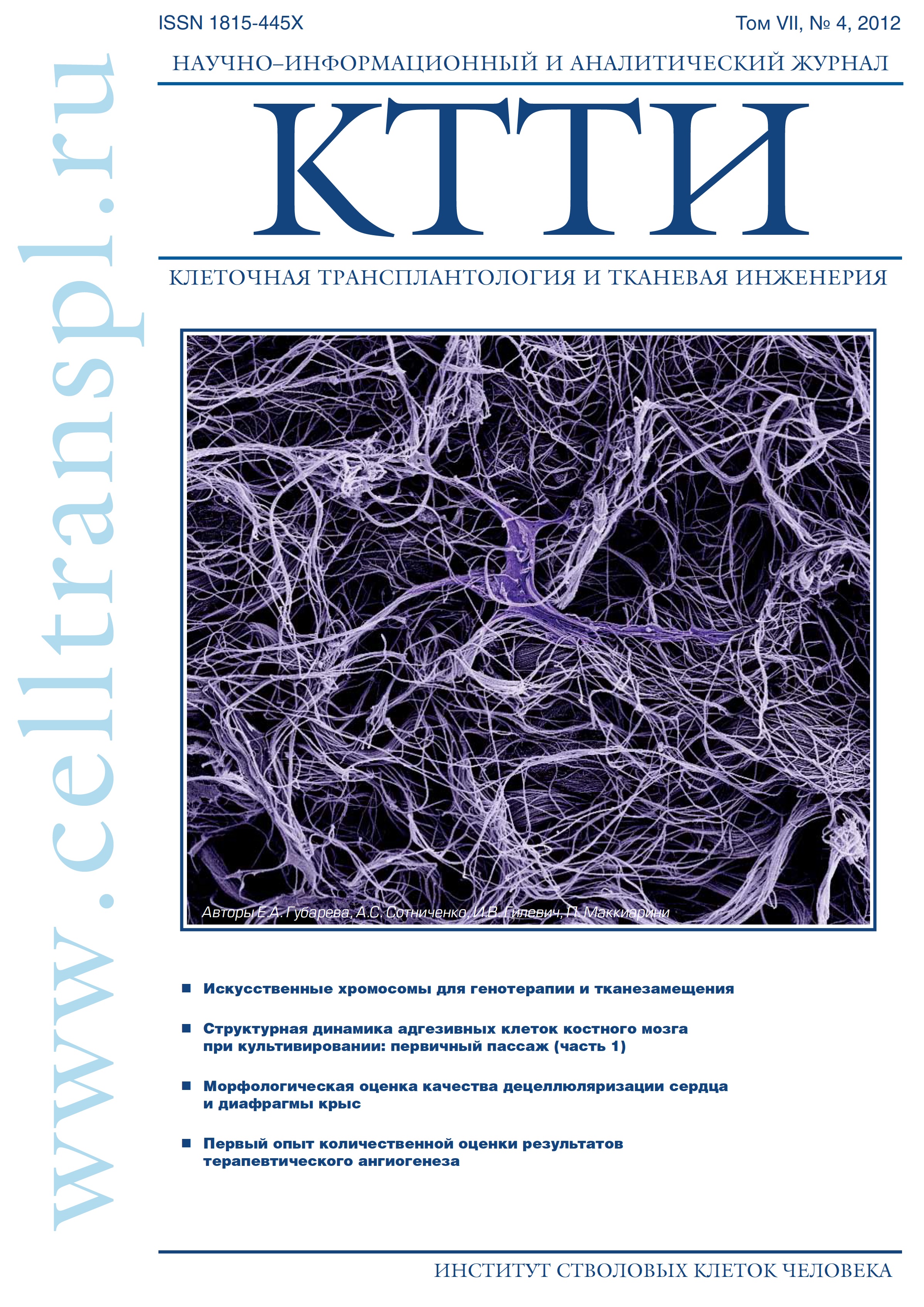Characteristics of placental multipotent mesenchymal stromal stem cells
- Authors: Shablii V.1,2, Kuchma M.1,2, Kyryk V.3, Onishchenko G.2,4, Areshkov P.1, Skrypnyk N.4, Lukash L.1, Lobyntseva G.2
-
Affiliations:
- Institute of Molecular Biology and Genetics of NAS of Ukraine, Kiev, Ukraine
- Institute of Cell Therapy, Kiev, Ukraine
- State Institute of Genetic and Regenerative Medicine of NAMS of Ukraine, Kiev, Ukraine
- Institute of Biology of the T. Shevchenko National University of Kiev, Kiev, Ukraine
- Issue: Vol 7, No 4 (2012)
- Pages: 55-61
- Section: Articles
- URL: https://genescells.ru/2313-1829/article/view/121575
- DOI: https://doi.org/10.23868/gc121575
- ID: 121575
Cite item
Abstract
Full Text
About the authors
V. Shablii
Institute of Molecular Biology and Genetics of NAS of Ukraine, Kiev, Ukraine; Institute of Cell Therapy, Kiev, Ukraine
M. Kuchma
Institute of Molecular Biology and Genetics of NAS of Ukraine, Kiev, Ukraine; Institute of Cell Therapy, Kiev, Ukraine
V. Kyryk
State Institute of Genetic and Regenerative Medicine of NAMS of Ukraine, Kiev, Ukraine
G. Onishchenko
Institute of Cell Therapy, Kiev, Ukraine; Institute of Biology of the T. Shevchenko National University of Kiev, Kiev, Ukraine
P. Areshkov
Institute of Molecular Biology and Genetics of NAS of Ukraine, Kiev, Ukraine
N. Skrypnyk
Institute of Biology of the T. Shevchenko National University of Kiev, Kiev, Ukraine
L. Lukash
Institute of Molecular Biology and Genetics of NAS of Ukraine, Kiev, Ukraine
G. Lobyntseva
Institute of Cell Therapy, Kiev, Ukraine
References
- Parolini О., Alviano F., Bagnara G.P. et al. Concise review: isolation and characterization of cells from human term placenta: outcome of the first international Workshop on Placenta Derived Stem Cells. Stem Cells 2008; 26: 300-11.
- Spitalieri P., Cortese G., Pietropolli A. et al. Identification of multipotent cytotrophoblast cells from human first trimester chorionic villi. Cloning Stem Cells 2009; 11(4): 535-56.
- McLean K., Gong Y., Choi Y. et al. Human ovarian carcinoma- associated mesenchymal stem cells regulate cancer stem cells and tumorigenesis via altered BMP production. J. Clin. Invest. 2011; 121(8): 3206-19.
- Bartosh T.J., Ylostalo J.H., Mohammadipoor A. et al. Aggregation of human mesenchymal stromal cells (MSCs) into 3D spheroids enhances their antiinflammatory properties. PNAS USA 2010; 107(31): 13724-9.
- Maier C.L., Pober J.S. Human placental pericytes poorly stimulate and actively regulate allogeneic CD4 T-cell responses. Arterioscl. Thromb. Vasc. Biol. 2011; 31: 183-9.
- Semenov O.V., Koestenbauer S., Riegel M. et al. Multipotent mesenchymal stem cells from human placenta: critical parameters for isolation and maintenance of stemness after isolation. Am. J. Obstet. Gynecol. 2010; 202(193): 1-13.
- Briese J., Oberndorfer M., Patschenik C. et al. Osteopontin is colocalized with the adhesion molecule CEACAM1 in the extravillous trophoblast of the human placenta and enhances invasion of CEACAM1- expressing placental cells. J. Clin. Endocrin. Metab. 2005; 90(9): 5407-13.
- Tarrade A., Schoonjans K., Pavan L. et al. PPAR-y/RXR-a heterodimers control human trophoblast invasion. J. Clin. Endocrin. Metab. 2001; 86(10): 5017-24.
- Okamoto K., Miyoshi S., Toyoda M. et al. «Working» cardiomyocytes exhibiting plateau action potentials from human placenta-derived extraembryonic mesodermal cells. Exp. Cell Res. 2007; 313 (12): 2550-62.
- Jamieson S.E., Roubaix L., Cortina-Borja M. et al. Genetic and epigenetic factors at COL2A1 and ABCA4 influence clinical outcome in congenital toxoplasmosis. PLoS ONE 2008; 3(6): 1-13.
- Pilz G.A., Ulrich C., Ruh M. et al. Human term placenta-derived mesenchymal stromal cells are less prone to osteogenic differentiation than bone marrow-derived mesenchymal stromal cells. Stem Cells Dev. 2011; 20 (4): 635-46.
Supplementary files










